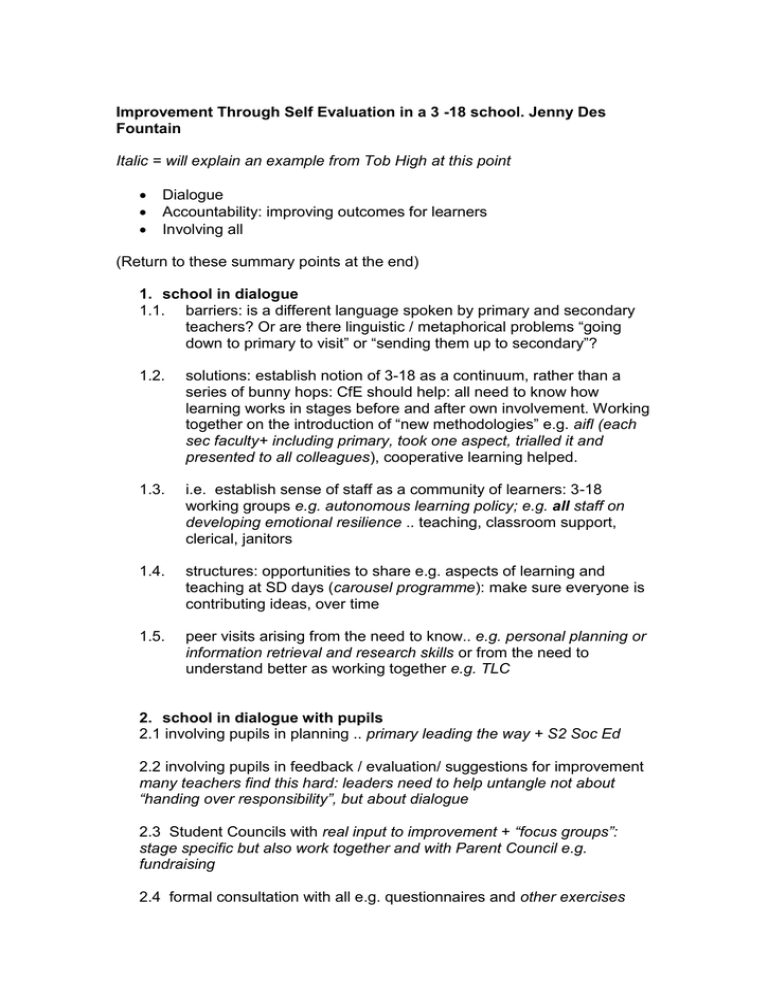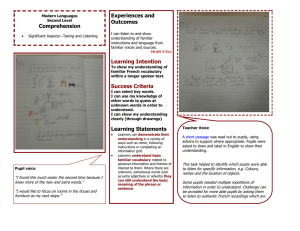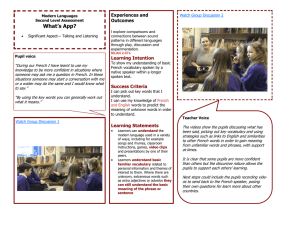Document 13200544
advertisement

Improvement Through Self Evaluation in a 3 -18 school. Jenny Des Fountain Italic = will explain an example from Tob High at this point Dialogue Accountability: improving outcomes for learners Involving all (Return to these summary points at the end) 1. school in dialogue 1.1. barriers: is a different language spoken by primary and secondary teachers? Or are there linguistic / metaphorical problems “going down to primary to visit” or “sending them up to secondary”? 1.2. solutions: establish notion of 3-18 as a continuum, rather than a series of bunny hops: CfE should help: all need to know how learning works in stages before and after own involvement. Working together on the introduction of “new methodologies” e.g. aifl (each sec faculty+ including primary, took one aspect, trialled it and presented to all colleagues), cooperative learning helped. 1.3. i.e. establish sense of staff as a community of learners: 3-18 working groups e.g. autonomous learning policy; e.g. all staff on developing emotional resilience .. teaching, classroom support, clerical, janitors 1.4. structures: opportunities to share e.g. aspects of learning and teaching at SD days (carousel programme): make sure everyone is contributing ideas, over time 1.5. peer visits arising from the need to know.. e.g. personal planning or information retrieval and research skills or from the need to understand better as working together e.g. TLC 2. school in dialogue with pupils 2.1 involving pupils in planning .. primary leading the way + S2 Soc Ed 2.2 involving pupils in feedback / evaluation/ suggestions for improvement many teachers find this hard: leaders need to help untangle not about “handing over responsibility”, but about dialogue 2.3 Student Councils with real input to improvement + “focus groups”: stage specific but also work together and with Parent Council e.g. fundraising 2.4 formal consultation with all e.g. questionnaires and other exercises 3. school in dialogue with parents and its community 3.1 consult in different ways; need to vary to keep fresh: 6 year cycle + responses to individuals when issues raised: all about being receptive and giving feedback so people know that you have taken action on a suggestion: School Board / S2 options 3.2 Parent Council / Open Days .. keeping parents + others informed and constant invitations for specific ways to be involved. THS geographically spread community: home/school notebooks? newsletter? website? blogs? Skills for work programme. Parent meetings1:1 in S1-3: replicating primary practice and success. 3.3 Home learning tasks +study packs which inform parents’ ability to support their youngsters: reader and scribe role (from 3.2): feedback + evaluations e.g. Soc Ed / primary research tasks 4. accountability: helpful pressure to achieve improved outcomes for pupils? All about creating an evidence base for meaningful dialogue, with a firm eye on the goal: Frank Crawford’s statement along the lines of .. I will do whatever it takes for success for all learners. If at first I don’t succeed, I will try something else. 4.1 SLT learning visits (I love this term, because as well as describing what you’re looking at, it also reminds you that you always learn something when you have the privilege of watching another colleague tech / watch learners at work) related to improvement plan or to specific pupils (pupil pursuit) with generic feedback to all staff for discussion at a staff meeting 4.2 SLT and PT and peer learning visits : focus / records 4.3 Working with partners e.g. effective use of classroom based support 4.4 Evidence folder in each faculty on each aspect: what we did and how it made a difference: not always that simple a link, but searching for it is a good discipline. i.e. Faculty calendar: how plan to work together on ITSE Learning visits records + outcomes Minutes of meetings discussing meeting pupils’ needs Pupil + parent evaluations Involving pupils in planning Faculty + school improvement plans + actions .. as a basis for dialogue again; with faculty colleagues and those in other faculties, 3-18; with fellow PTs (bring to meeting example of how you ask pupils to evaluate their courses); with line managers; with HT (3 meetings per year); with HMIe.




